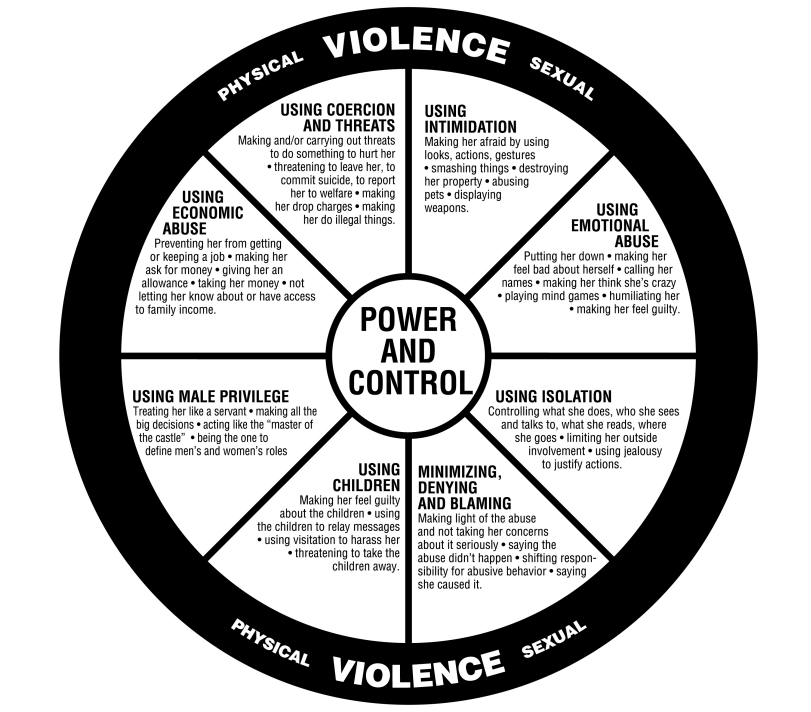"But They Never Hit Me": When Domestic Violence Isn't Physical
Many survivors of domestic violence never experience physical abuse. Learn to recognize the signs of emotional abuse, psychological manipulation, and coercive control in relationships.

What is Non-Physical Domestic Violence?
When most people hear the words “domestic violence,” they picture something loud and physical. Yelling, name-calling, and hitting. Bruises. Police cars. Neighbors peeking through their blinds at the disruption. And for some survivors, those images are frighteningly accurate.
But many survivors haven't experienced any physical violence at all. Instead, they’ve sat in a haze of confusion and self-doubt. Tip-toed around their words, not sure what to say without offending. Constantly wondered if they really were selfish or “too sensitive”.
Their friends and family dismissed the signs, oblivious to the subtle behaviors happening right in front of them.
These survivors may not have even labeled their experiences as abuse because it wasn’t loud or physical. No one called the police. The neighbors likely had no clue.
Psychological and emotional abuse are forms of domestic violence that can be just as damaging as physical violence— sometimes more so due to their insidious nature. These non-physical abuse patterns quietly erode autonomy and confidence, leaving survivors questioning their reality, minimizing their pain, and trapped in relationships that are slowly dismantling their sense of self.
Society's narrow perspective on domestic violence isn't just concerning— it's dangerous. It's time we broaden the narrative beyond dramatic moments and pay attention to the quieter, more underhanded abuses of power.
Society’s narrow perspective on domestic violence isn't just concerning– it's dangerous.
What Non-Physical Abuse Can Look Like
Petra* thought she was in a relationship with someone who was “just a little insecure.” He'd get hurt when she wanted to spend time with anyone else, saying things like "I guess I'm just not enough for you." He wanted to know who she'd be with, where she was going, what time she'd be home. When they were apart, he’d call and expect her to stay on the phone with him, even if she was at work. And he'd question her about the interactions he overheard, especially those with other males.
When she tried to bring up concerns, he'd flip the script: "I can't believe you'd accuse me of being controlling! I work so hard to keep you safe and happy." She'd end up apologizing, feeling guilty for starting the conversation.
Petra never thought of this as abuse. But she was living under a form of control that was isolating her, twisting her experience of love, and teaching her that her perceptions couldn't be trusted.

Common Forms of Psychological and Emotional Abuse
Monitoring and Surveillance:
- Checking phones, emails, social media accounts
- Location tracking and showing up unexpectedly
- Interrogating about daily activities
Isolation Tactics:
- Gradually cutting off access to friends and family using guilt
- Creating scheduling conflicts with or drama around social plans
- Making loved ones feel unwelcome or moving away from support systems
Financial Control:
- Managing all finances and preventing or discouraging work or education
- Hiding financial information, creating debt, or stealing money
- Using economic dependence as leverage
Emotional Manipulation:
- Gaslighting (making you question your memory or perception)
- Guilt-tripping and playing victim
- Love-bombing and/or withholding affection as punishment
Threats and Intimidation:
- Threatening suicide or to leave (and take children)
- Threatening to reveal private information
- Destroying personal items, aggressive driving, or using size/presence to intimidate
Sexual Coercion:
- Pressuring for sex or ignoring boundaries
- Using guilt or manipulation around intimacy
- Threatening infidelity or treating sex as an obligation
Emotional Incest (in family systems):
- Parents treating children as emotional partners
- Sharing inappropriate details about adult relationships with children
- Creating guilt around a child's normal development and independence
These aren't just "red flags"or minor boundary violations—they are abusive behaviors that add up to psychological domestic violence.
Understanding Coercive Control: More Than “Why They Stay”
Coercive control is a concept credited to Dr. Evan Stark and described as "a strategic course of conduct" involving "dominating, exploiting, and degrading a partner and depriving her of basic rights and resources."
Unlike the Power and Control Wheel framework– which labels physical and sexual violence as "abusive" and non-physically abusive behaviors as "subtle methods" reinforced by what society considers real domestic violence– coercive control recognizes that the process of establishing and maintaining power is abuse, in and of itself. And once power is established through coercive control, neither physical nor sexual violence is needed to reinforce or maintain it.

Coercive control creates a climate of fear, hopelessness, and dependence. It strips away autonomy and isolates victims from support. When a person lives under coercive control, they lose the ability to make basic decisions about their own life— what to wear, who to see, how to spend their time, what to think about themselves and their experiences. Their reality becomes one where the abuser's needs and perspectives are the only ones that matter.
Think of it this way: physical violence is an incident or happening. Coercive control is a condition or state of being– it’s the air you're breathing.
In that atmosphere,
- having someone monitor your every move might initially feel like concern or attentiveness.
- isolating from friends who "don't understand your relationship" might seem like loyalty.
- being led to doubt your own perceptions might appear as "helping you see things more clearly."
Manipulation becomes so pervasive that it starts to feel normal, even protective. But beneath seemingly caring behaviors is a calculated effort to subdue. It's no wonder survivors often describe "losing themselves" in such relationships– it's a literal description of what happens under coercive control.
Coercive control is a condition or state of being– it’s the air you're breathing.
Why Non-Physical Abuse Goes Unnamed (or Unnoticed)
"I didn't think it was abuse. I was starting to believe that my attitude was the problem, that I was overreacting," Cyrielle* told me during one of our sessions. She recalled pressure to settle in as a stay-at-home mother. Her partner made minimal coparenting efforts and accused her of ungratefulness when she talked about returning to work. With tears in her eyes, she told me of friends who called her “lucky” and said they wished they could be in her shoes.
It took months for Cyrielle to say the word "abuse" in relation to her marriage. She is still working through guilt, shame, and self-doubt– even as she navigates a second marriage with a partner she describes as engaged and supportive.

Cyrielle’s experience illustrates why non-physical abuse can be so hard to identify, even as you're living it:
It escalates gradually. By the time the control becomes obvious, it’s also become your normal. You've slowly acclimated to giving up more and more of yourself.
It mimics love. Our culture romanticizes jealousy, possessiveness, and emotional intensity. "He just loves me so much he doesn’t like us being apart" sounds romantic until you realize you can't move without fearing his reaction.
It targets your self-trust. Gaslighting and manipulation specifically undermine your ability to trust your own perceptions. When you constantly question whether you're "too sensitive," “so defensive,” or "always making a big deal out of nothing," you can't rely on your own experience to identify abuse.
It aligns with cultural and gender expectations. Society teaches that women should accommodate, men should provide and protect, and relationships require sacrifice and loyalty “for better or for worse.” These scripts frame controlling behavior as normal and enduring it as admirable.
It's invisible to others. Unlike physical abuse, psychological and emotional abuse leave no visible bruises. Friends and family struggle to see past an abuser’s public charisma, making survivors feel even more isolated and confused.
It affects your thinking. Chronic stress, isolation, and psychological manipulation actually change brain function. Decision-making becomes harder, self-esteem plummets, and the world outside the relationship can start to feel dangerous or impossible to manage.
It's not a "red flag" to you. Emotional incest normalizes unhealthy relationship dynamics and creates a template for continued use in adulthood. Those who experienced it in their families of origin might find "toxic" dynamics familiar and manageable— maybe even comforting— rather than alarming.
Self-Assessment: Questions Beyond "Did They Hit You?"
Instead of focusing so exclusively on physical violence, we need to consider the overall climate of our relationships.
Ask about autonomy and decision-making:
- Do you feel free to make basic life decisions?
- Can you spend time alone or with others besides your partner without fearing consequences?
- Can you express disagreement or different opinions?
Ask about emotional safety:
- Do you feel like you're biting your tongue or walking on eggshells?
- Are you afraid to be completely honest about your thoughts, preferences, and feelings?
- Do conversations often leave you confused about what really happened?
Ask about self-worth and identity:
- Do you feel like you've lost parts of yourself in the relationship?
- Have you stopped doing things you used to enjoy?
- Do you constantly question your partner’s description of your personality and character? Is it misaligned with your self-perception?
Ask about fear and control:
- Are you afraid of your partner's reaction to normal daily occurrences?
- Do you change your behavior, modify situations, or lower your expectations to avoid conflict?
- Does your partner push to know details about everything you do?
Ask about support and isolation:
- Do you feel comfortable reaching out to friends and family?
- Has your social circle shrunk since this relationship began?
- Is there someone you can talk openly to about problems in your relationship?
Ask your loved ones these types of questions. Ask them of your Self, and pay attention to your gut. If several made you uncomfortable or prompted excuses, that's invaluable information.
Getting Help for Non-Physical Domestic Violence

You don't need bruises to call it domestic violence. You don't need screaming, police reports, or gripping stories.
If someone is undermining your autonomy, manipulating your reality, isolating you from support, or creating an environment where you can't safely be yourself, that's psychological abuse– a form of domestic violence.
Know these truths:
- Your experience matters.
- Your feelings are valid.
- You have a right to live fully and freely.
Trust your sense that something isn't right. Trust that healthy relationships don't require you to become smaller, quieter, or less yourself. Trust that love doesn't look like control, and protection doesn't feel like fear.
Name what's happening to you; it’s how you begin reclaiming the right to define your own experience. It's how you start reconnecting to who you are when no one is manipulating you.
Reach out for help— whether to a trusted friend, a therapist, or a domestic violence hotline. You don't to have all the answers or make any immediate decisions. Sometimes the first step is simply speaking your truth to someone who will hear and believe you.
Resources
- National Domestic Violence Hotline: 1-800-799-7233 (24/7 confidential support)
- TTY: 1-800-787-3224
- Text: START to 88788
- Online chat: thehotline.org
If you live in the states of Louisiana, Texas, or Washington and are interested in working together, schedule a free consultation.
*Names and details have been changed to protect client confidentiality.
